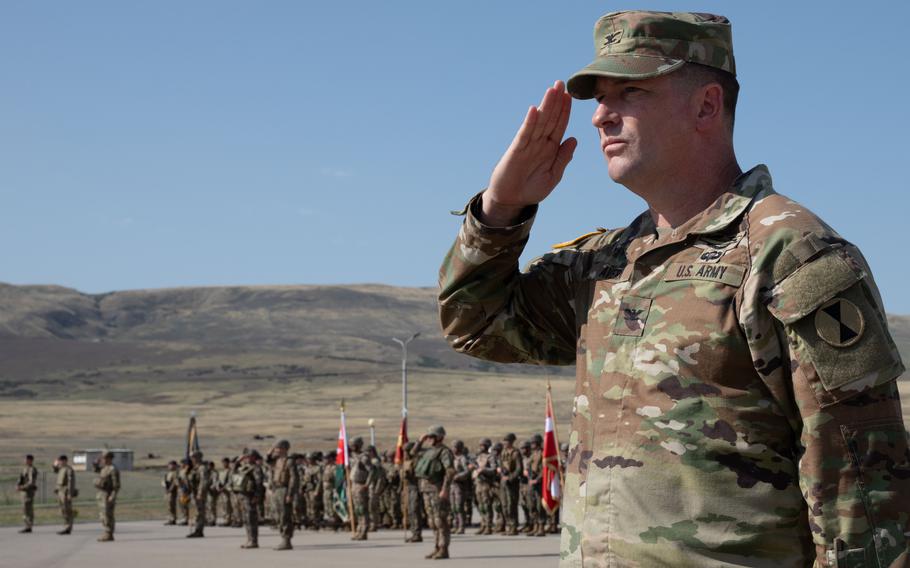
Col. John Avera of the Georgia Army National Guard salutes during the opening ceremony of exercise Agile Spirit at Krtsanisi Training Area, Georgia, on Aug. 21, 2023. (Chasity Williams/Army)
A NATO military exercise underway in the Caucasus nation of Georgia should help dispel worries that the country is becoming “pro-Russian,” even as it attempts to build a more pragmatic relationship with Moscow, analysts say.
Georgia’s government has come under fire in recent months for not sanctioning Russia after the February 2022 invasion of Ukraine and for refusing to supply weapons to Kyiv. Georgian Prime Minister Irakli Garibashvili has also described NATO expansion as a main cause of the war.
But in welcoming troops Monday from nearly two dozen NATO and partner countries for two weeks of war games, Tbilisi has shown that it remains keen to cooperate with the Western alliance.
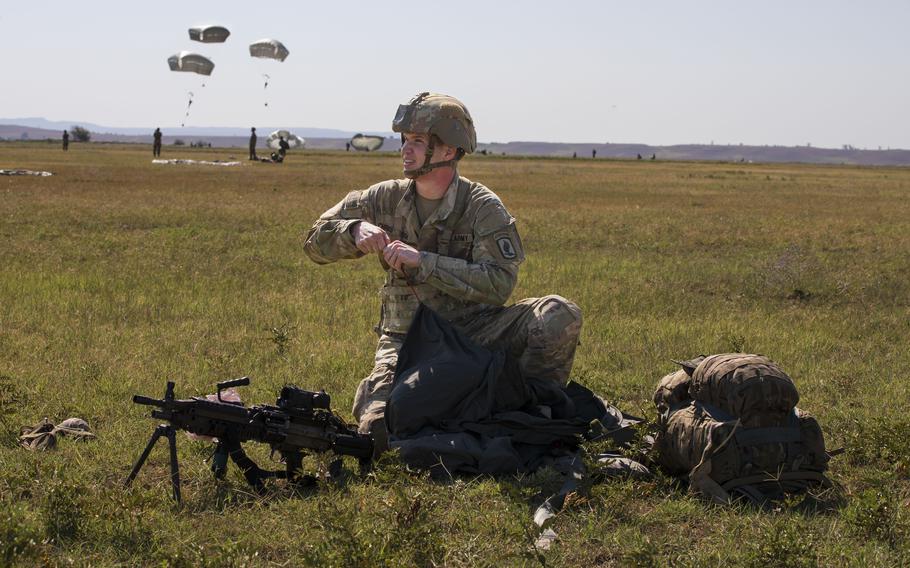
Army Pfc. Oluf Christensen gathers his parachute at Vaziani Training Area, Georgia, on Aug. 23, 2023, during Exercise Agile Spirit. (Allison Gilstrap/Army)
“Georgia is still an important partner, particularly due to the geopolitical changes and risks,” said Andras Racz, a senior fellow at the German Council on Foreign Relations. “This transformation of the geopolitical environment, I think, should override occasional fallbacks in bilateral NATO-Georgia relations.”
The Agile Spirit exercise — which has brought together some 3,500 troops, including about 1,200 Americans — has been held regularly in Georgia since 2011, three years after the “Five Day War,” which saw Russian forces storm the small country to prop up two separatist regions, Abkhazia and South Ossetia.
Russian forces remain in those regions, and many Georgians fear that whatever the outcome in Ukraine, the Kremlin might be inclined to try to occupy more Georgian territory. These concerns must be considered when analyzing Tbilisi’s actions, experts say.
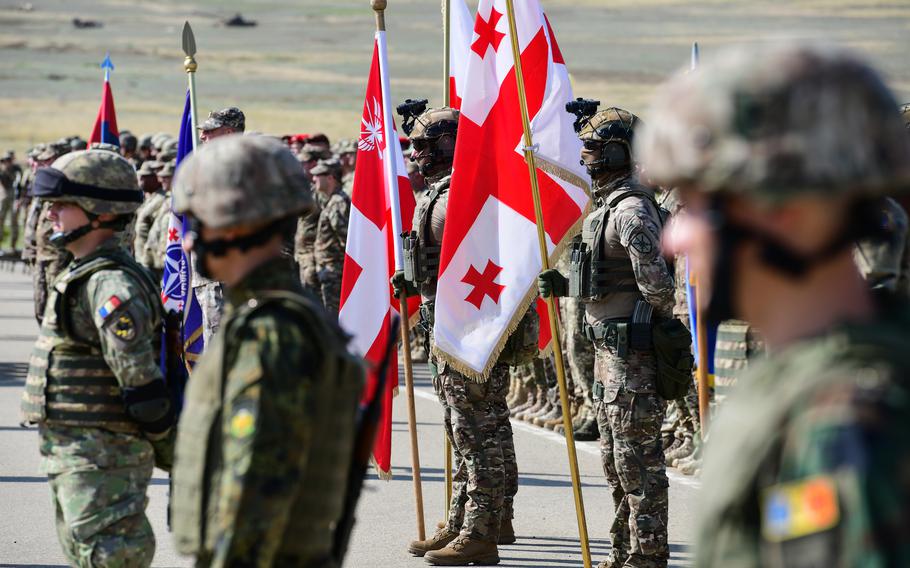
Service members from all participating allied and partner nations, including U.S. soldiers and Marines, stand in formation at the opening ceremony of Exercise Agile Spirit near Tbilisi, Georgia, on Aug. 21, 2023. (Markus Rauchenberger/Army)
“Georgia is clearly looking to find a balanced approach by pursuing a better relationship with Russia but at the same time maintaining a partnership with NATO,” said Charles Kupchan, a senior fellow at the New York-based Council on Foreign Relations.
“That approach does not entail a decision to avoid exercises with NATO, as this particular exercise is making clear,” Kupchan added.
The U.S. Army and Georgian Defense Forces are leading Agile Spirit, which has seen the number of participating countries jump threefold since the inaugural exercise over a decade ago. Among this year’s attendees are 10 countries that were once part of the Eastern bloc.
The brigade-level exercise is spread across several sites in Georgia and an air base in neighboring Turkey. It features field training, live-fire demonstrations and various response scenarios to simulate a realistic combat environment, the Army said in a statement Tuesday.
A joint forcible entry into Turkey, a maneuver to seize and hold territory that’s considered one of the most challenging and complex missions assigned to the Army, is also scheduled, according to the statement.
“We want these simulations to be as real as they possibly can be,” said Col. John Avera, commander of the 122nd Tactical Support Detachment, 78th Troop Command, Georgia Army National Guard, who helped direct the exercise.
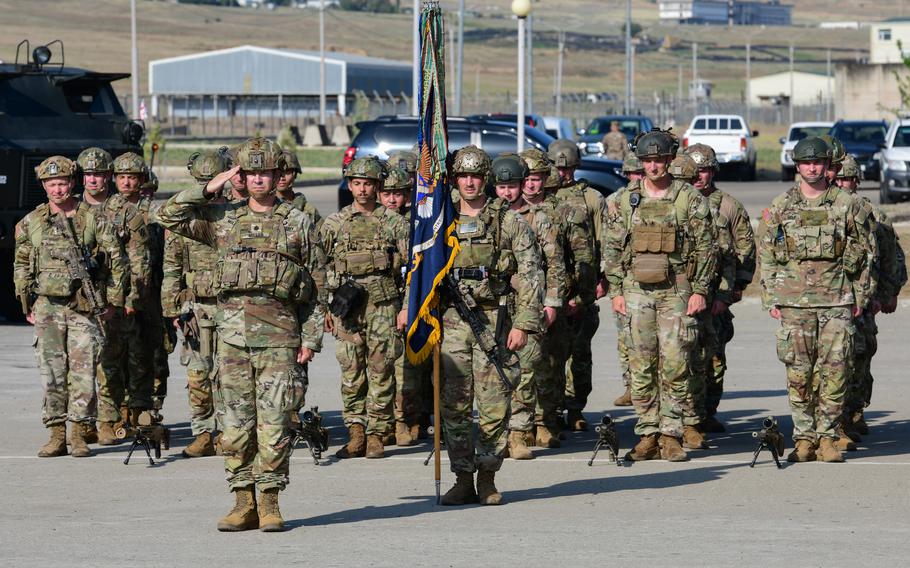
Lt. Col. Geoffrey Miller of the Georgia National Guard salutes during the opening ceremony of Exercise Agile Spirit near Tbilisi, Georgia, on Aug. 21, 2023. (Markus Rauchenberger/Army)
In addition to the Georgia Army National Guard, the U.S. contingent includes U.S. Army Europe and Africa, U.S Air Forces in Europe and U.S. Special Forces Command Europe.
Avera described how the U.S. will benefit from the exercise, saying “we must operate in the field because when you fight, that’s where you end up.”
While Agile Spirit could add to regional tensions, it’s imperative that the drills proceed, according to Kupchan.
“They are seen from Moscow as more provocative, but they become all the more important because they strengthen deterrence of Russia and Russian adventurism,” Kupchan said.
Georgia is not a NATO member, but alliance Secretary-General Jens Stoltenberg recently described it as “one of NATO’s closest partners.” In 2008, Georgia was told it would eventually be brought into the trans-Atlantic fold.
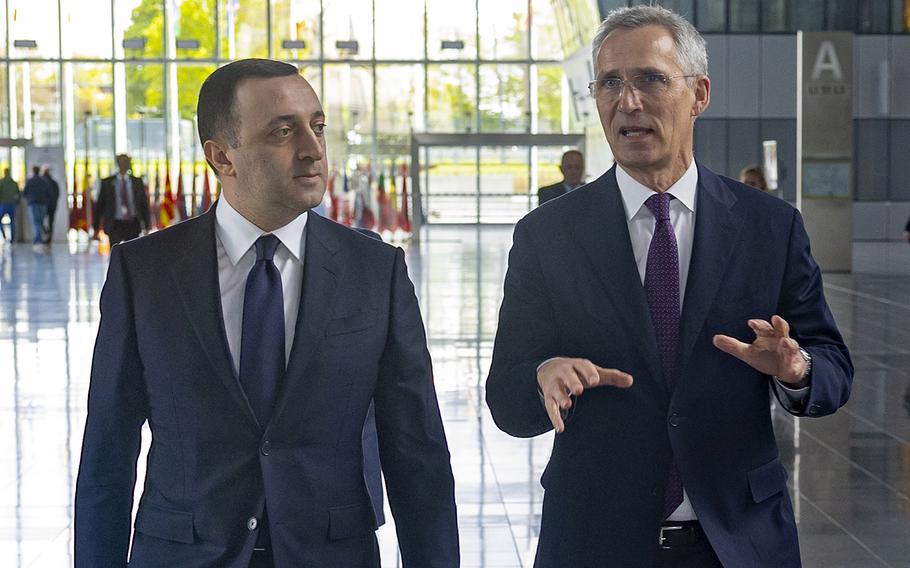
NATO Secretary-General Jens Stoltenberg, right, meets with the prime minister of Georgia, Irakli Garibashvili, at NATO headquarters in Brussels, on April 24, 2023. Stoltenberg recently described Georgia as one of NATO’s closest partners. (NATO)
The Georgia Army National Guard and the country of Georgia have been partners under the DOD’s State Partnership Program since the 1990s, and that has helped put the county on a path to NATO acceptance.
Georgian soldiers also fought side by side with U.S. troops in Iraq and Afghanistan.
Mark Cancian, a senior adviser at the Center for Strategic and International Studies whose son trained Georgian troops in their home country while serving as a Marine, said this year’s Agile Spirit exercise is a symbol of the continued cooperation between Georgia and the West.
“We have this long-standing military relationship, and it would be a major signal to Russia if we walk away from it,” Cancian said.